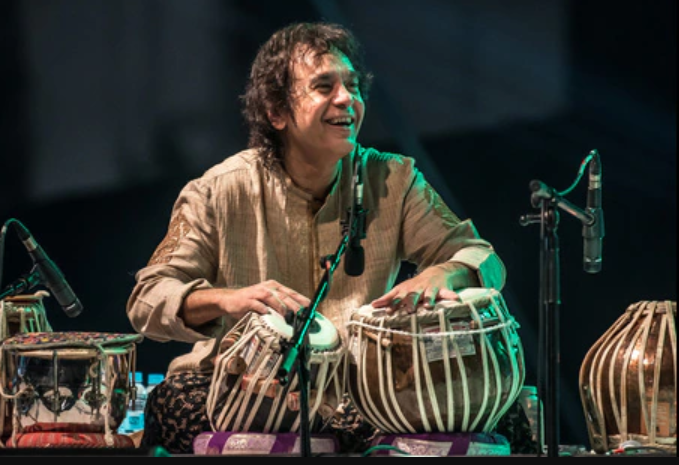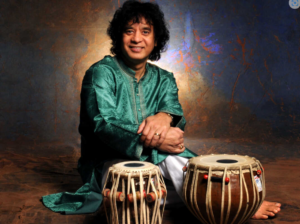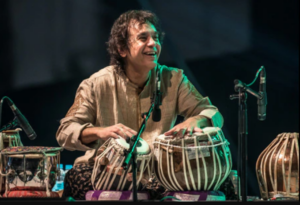
Zakir Hussain
Zakir Hussain: A Legend Who Revolutionized Indian Classical Music
Zakir Hussain, one of the most iconic tabla players in the world, transformed the landscape of Indian classical music, creating a legacy that stretches across continents and generations. Born into a family steeped in musical tradition, Zakir’s genius and dedication reshaped the role of the tabla in classical performances, elevating it from a traditional accompaniment to a dynamic and versatile solo instrument.
Zakir Hussain : Early Life and Musical Journey
Born on March 9, 1951, in Mumbai, Zakir Hussain was introduced to the tabla at the age of three by his father, the legendary Ustad Allah Rakha. His father, one of the most respected tabla maestros, was a significant influence in shaping his early musical development. Zakir’s natural affinity for rhythm and his dedication to his craft quickly became evident. By the age of twelve, he was already performing publicly, showcasing his remarkable command over the instrument.

As he grew older, Zakir’s musical horizons expanded through exposure to some of the finest musicians of his time, including Pandit Kishan Maharaj and Ravi Shankar. His deep understanding of classical music, coupled with his unique style, soon set him apart from other tabla players. While his classical training remained a cornerstone of his work, it was his ability to integrate different musical genres that set him apart as a true innovator.
The Globalization of Indian Classical Music
What truly marked Zakir Hussain’s career was his ability to take Indian classical music to international audiences. His global journey began in the 1980s when he started collaborating with international artists, bridging the gap between Eastern and Western musical traditions. Through his performances with jazz legends like John McLaughlin and Mickey Hart, Hussain was able to introduce the tabla to audiences unfamiliar with Indian classical music.
One of his groundbreaking contributions was his role in the band Shakti, formed with John McLaughlin. The group blended the rhythms of Indian classical music with the improvisational nature of jazz, a fusion that had never been heard before. This unique blend of Eastern and Western musical traditions revolutionized how Indian music was perceived globally. Hussain’s ability to collaborate with artists from different musical backgrounds, including George Harrison of The Beatles, further broadened the global appeal of Indian music.
Furthermore, his performances alongside Ravi Shankar helped solidify his place as a cultural ambassador for Indian classical music. Their collaboration introduced the intricate and emotive aspects of Indian rhythms to Western audiences, earning both musicians widespread recognition. Through his work with Ravi Shankar, Hussain demonstrated the power of Indian classical music to transcend cultural barriers and bring people together.
Innovations in Tabla Performance
While Zakir Hussain’s contributions to globalizing Indian classical music were significant, his innovations in tabla performance were equally transformative. Traditionally, the tabla was considered an accompanying instrument to vocalists or other instrumentalists in classical performances. However, Zakir redefined the tabla’s role by presenting it as a solo instrument capable of standing alone in a performance.

Zakir’s mastery of rhythm and his ability to execute complex tabla compositions made him a true virtuoso. His performances were a dazzling display of intricate patterns and lightning-fast finger techniques, yet they always retained the soul and emotional depth of classical Indian music. His ability to weave intricate rhythms into a seamless performance captured the imagination of audiences worldwide, showcasing the tabla as a powerful solo instrument in its own right.
Moreover, Zakir introduced numerous new compositions and rhythmic structures, incorporating his own innovations while staying true to classical Indian traditions. His signature style combined the discipline of classical music with an element of improvisation, ensuring that each performance was unique. Through his live performances, he demonstrated the versatility of the tabla, proving that it could serve not just as an accompaniment, but as the central voice in a musical dialogue.
Legacy and Recognition
Throughout his illustrious career, Zakir Hussain received numerous accolades and awards, reflecting his contribution to both Indian and global music. In 1987, he was honored with the Padma Shri by the Government of India, one of the highest civilian awards in the country. He was later awarded the Padma Bhushan in 2002 for his outstanding contributions to music. In recognition of his global influence, he also received the National Heritage Fellowship from the National Endowment for the Arts in the United States in 1999, an honor rarely bestowed on non-American artists.
Zakir’s influence extends far beyond his own performances. He played a pivotal role in shaping the future of tabla playing, not just through his innovations but also by mentoring younger generations of musicians. His students, many of whom have gone on to become renowned tabla players in their own right, are a testament to his commitment to preserving and evolving the art form. By teaching his students the intricacies of tabla playing, Hussain ensured that his legacy would continue through the next generation of musicians.
The Enduring Influence of Zakir Hussain
Zakir Hussain’s passing marked the end of an era in Indian classical music, yet his legacy is far from over. His contributions to music will continue to influence musicians and audiences around the world. His work as a solo artist, his collaborations with international musicians, and his groundbreaking role in popularizing Indian classical music have made him an iconic figure in the global music scene.
As the world remembers Zakir Hussain, his influence lives on through the tabla, which he transformed from a traditional accompaniment into a celebrated solo instrument. His collaborations, his music, and his teachings have left an indelible mark on the world of music. Zakir’s ability to cross cultural boundaries and bring diverse musical traditions together has made him not only a legend in Indian classical music but also a global ambassador for the power of music to unite people.

His legacy is a testament to the transformative power of art and music, and Zakir Hussain will forever be remembered as a trailblazer who revolutionized Indian classical music and brought it to the world stage.





